A list of films produced in Argentina in 1980:
A list of films produced in Argentina in 1980:
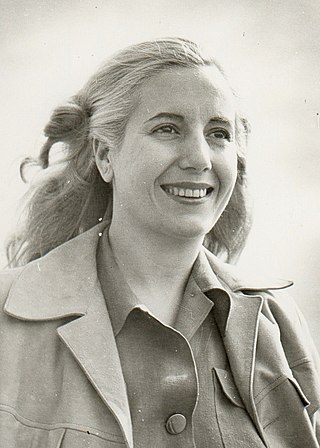
María Eva Duarte de Perón, better known as just Eva Perón or by the nickname Evita, was an Argentine politician, activist, actress, and philanthropist who served as First Lady of Argentina from June 1946 until her death in July 1952, as the wife of Argentine President Juan Perón. She was born in poverty in the rural village of Los Toldos, in the Pampas, as the youngest of five children. In 1934, at the age of 15, she moved to the nation's capital of Buenos Aires to pursue a career as a stage, radio, and film actress. She married Perón in 1945, when he was still an army colonel, and was propelled onto the political stage when he became President in 1946. She became a central figure of Peronism and Argentine culture because of the Eva Perón Foundation, a charitable organization perceived by many Argentinians as highly impactful.

Evita is a musical with music by Andrew Lloyd Webber and lyrics by Tim Rice. It concentrates on the life of Argentine political leader, activist and actress Eva Perón, the second wife of Argentine president Juan Perón. The story follows Evita's early life, rise to power, charity work, and death.
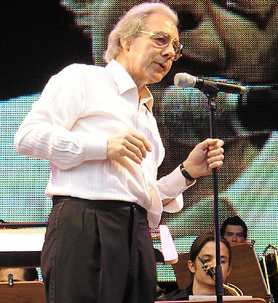
Boris Claudio "Lalo" Schifrin is an Argentine-American pianist, composer, arranger, and conductor. He is best known for his large body of film and TV scores since the 1950s, incorporating jazz and Latin American musical elements alongside traditional orchestrations. He is a five-time Grammy Award winner; he has been nominated for six Academy Awards and four Emmy Awards.

Héctor Eduardo Babenco was an Argentine-Brazilian film director, screenwriter, producer and actor who worked in several countries including Brazil, Argentina, and the United States. He was one of the first Brazilian filmmakers to gain international critical acclaim, through his films which often dealt with social outcasts on the fringes of society. His best-known works include Pixote (1980), Kiss of the Spider Woman (1985), Ironweed (1987), At Play in the Fields of the Lord (1990) and Carandiru (2003).

Libertad Lamarque Bouza was an Argentine and Mexican actress and singer, became one of the most iconic stars of the Golden Age of cinema in both Argentina and Mexico. She achieved fame throughout Latin America, and became known as "La Novia de América". By the time she died in 2000, she had appeared in 65 films and six telenovelas, had recorded over 800 songs and had made innumerable theatrical appearances.
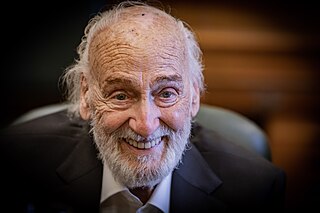
Héctor Benjamín Alterio Onorato is an Argentine theatre, film and television actor, well known both in Argentina and Spain.
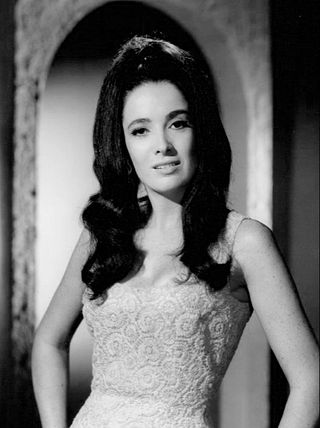
Marta Victoria Moya Peggo Burges, known professionally as Linda Cristal, was an Argentine-American actress. She appeared in a number of Western films during the 1950s, before winning a Golden Globe Award for her performance in the 1958 comedy film The Perfect Furlough.

Gustavo Alfredo Santaolalla is an Argentine composer and musician. Known for his minimalist approach to composing, he rose to fame for creating the scores for Brokeback Mountain (2005) and Babel (2006), for which he received two Academy Awards for Best Original Score in consecutive years. Santaolalla also gained recognition for his work on The Last of Us game series, composing the 2013 title and its 2020 sequel. He returned to reprise his themes and co-compose the score for the 2023 television adaptation.
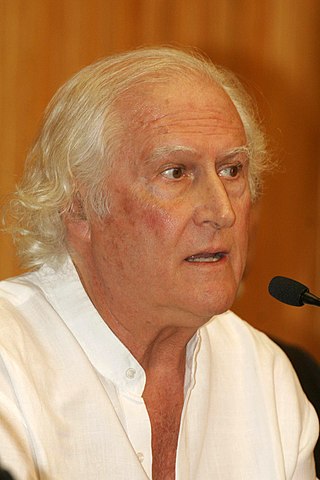
Fernando Ezequiel "Pino" Solanas was an Argentine film director, screenwriter, score composer and politician. His films include; La hora de los hornos (1968), Tangos: el exilio de Gardel (1985), Sur (1988), El viaje (1992), La nube (1998) and Memoria del saqueo (2004), among many others. He was National Senator representing the Autonomous City of Buenos Aires for six years, from 2013 to 2019.

Cinema of Argentina refers to the film industry based in Argentina. The Argentine cinema comprises the art of film and creative movies made within the nation of Argentina or by Argentine filmmakers abroad.
This is an index to pages listing Argentine films ordered by year of release. For an A-Z list, see Category:Argentine films.

Santiago Gómez Cousillas was a Uruguayan - Argentine actor notable for his work during the classical era of Argentine cinema. He appeared in films between 1936 and 1980.

Fernando Ayala was an Argentine film director, screenwriter and film producer of the classic era. He is widely considered one of the most important Argentine film directors and producers in the history of the cinema of Argentina.

Carlos Rinaldi was an Argentine film director of the classical era of Argentine cinema and beyond. He began his career in 1937 with Argentina Sono Film, working in editing. Subsequently, he joined Associated Argentine Artists, where he was responsible for the editing of the company's entire production, earning recognition as the leading editor of his time. Rinaldi made his directorial debut with La cuna vacía in 1949 and directed numerous films until 1980.

Luis Sandrini was a prolific Argentine comic film actor and film producer. Widely considered one of the most respected and most acclaimed Argentine comedians by the public and critics. He made over 80 appearances in film between 1933 and 1980, and was one of the most popular actors of the Golden Age of Argentine cinema.

Emilio Vieyra, sometimes credited as Raúl Zorrilla, was an Argentine film director, actor, screenwriter and film producer, between 1950 and the 1990s. He was born in Buenos Aires, Argentina. He is mostly known for his action and horror films, which were usually grounded in the exploitation genre.

Alita Blanca Barchigia, better known as Alita Román, was an Argentine film actress of the Golden Age of Argentine cinema.

The cinema of Uruguay has a role in the culture of Uruguay and is a part of Latin American cinema. Since the late 1990s, Uruguayan cinema has undergone a process of evolution, during which its films have received positive reviews and been internationally recognized. Over 120 films, fiction and non-fiction, have been produced since then.

Alejandro Doria was a noted Argentine cinema and television director.
The Silver Condor Award for Best Film, given by the Argentine Film Critics Association, awards the best film in Argentina each year: There were no ceremonies held in 1958, from 1974 until 1980, and in 1983.